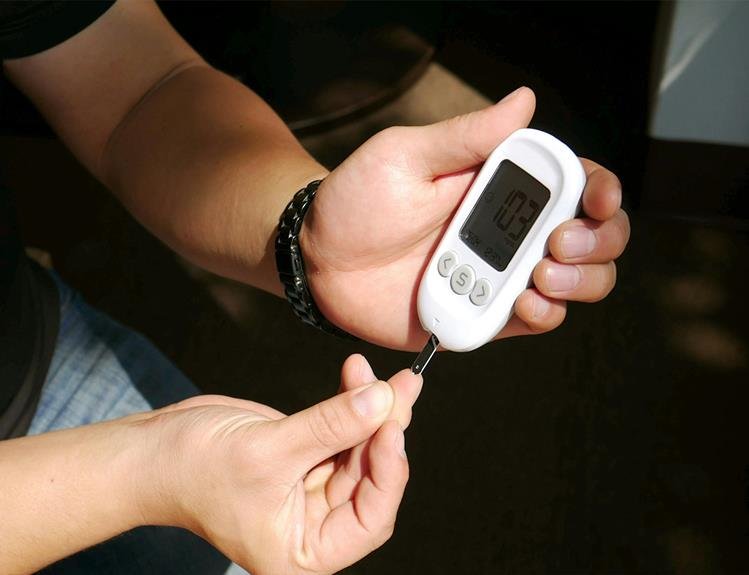5 Essential Tips for Managing Prediabetes Through Diet and Exercise
To navigate the realm of prediabetes management, think of your body as a finely tuned machine that requires proper care and attention.
By incorporating simple yet effective strategies into your daily routine, you can take charge of your health and pave the way for a brighter, healthier future.
From making mindful food choices to engaging in regular physical activity, these essential tips can empower you to make positive changes and achieve better overall well-being.
Understanding Prediabetes
If you have prediabetes, it means your blood sugar levels are higher than normal but not high enough to be classified as diabetes. This condition puts you at a higher risk of developing type 2 diabetes if lifestyle changes aren't made. Prediabetes often doesn't show any symptoms, so it's crucial to get tested if you have risk factors such as being overweight, leading a sedentary lifestyle, or having a family history of diabetes.
Understanding prediabetes is the first step towards managing your health effectively. By recognizing this early warning sign, you have the opportunity to make positive changes in your diet and exercise routine to prevent the progression to type 2 diabetes. It's essential to monitor your blood sugar levels regularly, as well as work closely with healthcare professionals to develop a personalized plan that suits your needs.
Take control of your health by acknowledging your prediabetes status and committing to a healthier lifestyle. With the right approach, you can delay or even prevent the onset of type 2 diabetes.
Importance of Balanced Nutrition
To effectively manage your prediabetes and reduce the risk of developing type 2 diabetes, the importance of balanced nutrition can't be overstated. A balanced diet plays a crucial role in regulating blood sugar levels, maintaining a healthy weight, and supporting overall well-being. Focus on incorporating a variety of nutrient-rich foods such as fruits, vegetables, whole grains, lean proteins, and healthy fats into your meals.
Keep an eye on your carbohydrate intake and opt for complex carbohydrates like whole grains, legumes, and starchy vegetables over refined sugars and processed foods. These complex carbohydrates are digested more slowly, preventing sudden spikes in blood sugar levels. Additionally, ensure you're consuming adequate fiber, which aids in digestion and helps control blood sugar levels.
Balanced nutrition also means moderating your portion sizes and being mindful of your calorie intake. Eating regular, well-proportioned meals throughout the day can help prevent unhealthy snacking and overeating. Remember, making small, sustainable changes to your diet can have a significant impact on managing your prediabetes and improving your overall health.
Incorporating Regular Exercise
Incorporate regular physical activity into your routine to complement your balanced nutrition and effectively manage prediabetes. Exercise plays a crucial role in improving insulin sensitivity, lowering blood sugar levels, and reducing the risk of developing type 2 diabetes.
Aim for at least 150 minutes of moderate-intensity aerobic activity per week, such as brisk walking, cycling, or swimming. Additionally, include strength training exercises two days a week to build muscle mass and further enhance your body's ability to regulate blood sugar.
To make exercise a sustainable habit, choose activities that you enjoy and are realistic for your schedule. Consider joining group fitness classes, working out with a friend, or exploring outdoor activities to keep things interesting.
Remember that consistency is key, so try to spread out your workouts throughout the week and stay committed to your exercise plan.
Keep track of your progress by monitoring your activity levels and setting achievable goals. Celebrate your accomplishments, no matter how small, to stay motivated and continue making positive lifestyle changes for better prediabetes management.
Managing Stress Levels
After establishing a routine of regular exercise to manage your prediabetes, it's crucial to address the impact of stress on your overall health by focusing on managing stress levels effectively. Stress can have a significant influence on blood sugar levels, making it essential to find ways to reduce and cope with stress.
One effective method is practicing relaxation techniques such as deep breathing, meditation, or yoga. These activities can help calm your mind and body, lowering stress hormones and promoting better blood sugar control.
In addition to relaxation techniques, engaging in regular physical activity can also help combat stress. Exercise is known to release endorphins, which are natural mood lifters, and can help reduce feelings of stress and anxiety. Finding an activity you enjoy, whether it's walking, swimming, or dancing, can make exercise a fun and effective stress-reliever.
Furthermore, maintaining a healthy lifestyle with a balanced diet, regular exercise, and sufficient sleep is crucial for managing stress levels effectively. Prioritizing self-care and incorporating stress-management techniques into your daily routine can significantly benefit your overall health and help in managing prediabetes successfully.
Monitoring Progress and Adjusting
Keep track of your prediabetes management by monitoring progress and making necessary adjustments along the way. Regularly check your blood sugar levels as advised by your healthcare provider to see how well your diet and exercise routine are working.
Use a journal or an app to record your meals, physical activity, and any symptoms you experience. By keeping a detailed log, you can identify patterns and make informed decisions about what changes may be needed.
If you notice that your blood sugar levels are consistently high or if you're not seeing the desired progress, don't hesitate to consult with your healthcare team. They can help you adjust your meal plan, exercise regimen, or medication if necessary.
Remember that managing prediabetes is a dynamic process, and what works for you now may need to be modified in the future. Stay proactive and adaptable to ensure you're effectively managing your condition.
Frequently Asked Questions
Can Prediabetes Be Reversed Through Diet and Exercise Alone?
Yes, prediabetes can be reversed through diet and exercise alone. By making healthy food choices and staying active, you can improve your blood sugar levels and reduce your risk of developing type 2 diabetes.
Are There Any Specific Foods or Exercises That Should Be Avoided for People With Prediabetes?
To manage prediabetes, you should limit sugary treats and processed foods. Try to avoid long periods of inactivity and prioritize regular exercise. Making these adjustments can help you maintain a healthier lifestyle and reduce your risk of developing diabetes.
How Often Should Stress Management Techniques Be Incorporated Into a Prediabetes Management Plan?
Incorporate stress management techniques daily for better prediabetes management. Practice deep breathing, meditation, or yoga to reduce stress levels. Consistent stress relief helps maintain healthy blood sugar levels and overall well-being in your journey.
What Are Some Common Pitfalls to Avoid When Monitoring Progress and Adjusting Lifestyle Habits for Prediabetes?
When tracking progress and changing habits for prediabetes, avoid the pitfall of inconsistency. Stay vigilant in monitoring blood sugar levels and adhere to a balanced diet and exercise routine. Small, steady steps lead to lasting results.
Are There Any Supplements or Alternative Therapies That Can Help Manage Prediabetes in Addition to Diet and Exercise?
You can explore supplements like chromium, magnesium, and alpha-lipoic acid for managing prediabetes alongside diet and exercise. Consult your healthcare provider to ensure these alternatives are safe and effective for your individual needs.
Conclusion
In conclusion, managing prediabetes through diet and exercise is crucial for your overall health. By incorporating balanced nutrition and regular exercise into your routine, you can effectively lower your risk of developing type 2 diabetes. Remember to also manage stress levels and monitor your progress regularly.
Small lifestyle changes can make a big difference in preventing the progression of prediabetes. Stay proactive in taking care of your health to achieve long-term success.





